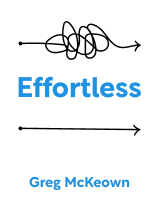

This article is an excerpt from the Shortform book guide to "Effortless" by Greg McKeown. Shortform has the world's best summaries and analyses of books you should be reading.
Like this article? Sign up for a free trial here.
What is Greg McKeown’s Effortless about? What is the key message to take away from the book?
In his book Effortless, Greg McKeown gives advice on how to make the most of your time by making your life easier. First, you must adopt what he calls an “effortless mindset”: one where you’re focused, rested, and aware of your surroundings. When you establish an effortless mindset, you’re able to perform the most important and challenging tasks with relative ease.
Let’s explore the steps you can take towards living more effortlessly, according to Greg McKeown.
Embrace the Easy Approach
According to McKeown, the first step in reaching an effortless mindset is to constantly look for ways to make things easier instead of overexerting yourself. This isn’t laziness—it’s resourcefulness. However, embracing this idea is difficult because we’re taught throughout life that to accomplish anything of value we must work hard. The assumption that we must toil to achieve anything is built into the very framework of our society. But McKeown states that this assumption is false and damaging. Achievement doesn’t have to be hard, and ridding yourself of this notion will help you produce more with less effort.
of this notion will help you produce more with less effort.
| Find What Works for You In Effortless, Greg McKeown argues that the cultural belief that hard work equates to more success is insidious, and many self-help books support the “hard work fallacy.” For example, in The Psychology of Selling, Brian Tracy argues that the secret to success is putting in the extra effort. To be a top salesperson, he says, you need to work harder than your peers. McKeown would say that this isn’t necessarily true, and success in any field can be achieved by finding ways to be productive without outworking those around you and potentially overexerting yourself. Another reason people believe in the hard work fallacy is due to survivorship bias. Survivorship bias is when people make false assumptions based on the success of the “survivors” and not the failure of everyone else. Just because a few people have achieved success through hard work doesn’t mean it will work for everyone, and it doesn’t mean that’s the only path to success. |
Turn Tedium Into Fun
When we have fun, it doesn’t feel like we’re putting in much effort. Therefore, instead of learning to endure essential tasks, McKeown recommends finding ways to enjoy them. One of the main reasons we struggle to get important things done consistently is that we dread doing them and thus put them off for as long as possible. There are several ways we can make our most important activities more enjoyable or, at the very least, less overwhelming.
Combine Work and Play
One way you can learn to enjoy a mandatory activity is to combine it with an activity you already enjoy. McKeown notes that some people try to self-motivate by rewarding themselves after they complete an activity, but he argues that’s less effective than combining the reward and essential activity. For example, enjoy your favorite snack while you file that dreaded business report, not after. This way, you look forward to the activity you once dreaded because it’s now associated with something you enjoy.
Add Meaning to Daily Activities
McKeown argues that infusing daily habits with meaning can also help make them more enjoyable. Imbuing an activity with meaning makes it feel more valuable, which can provide a new psychological benefit and make the activity feel more effortless. This simple change in attitude can turn a tedious chore into an activity that brings comfort or joy. For example, when making dinner, focus on the nourishment the food provides your mind and body. When viewed in this way, cooking a meal may become a more meaningful and enjoyable experience.
(Shortform note: In The Happiness Project, Gretchen Rubin also argues that adding purpose to activities can bring you comfort and joy, but she recommends a different approach. Instead of adding purpose to tedious chores, Rubin says you should add purpose to the activities you enjoy. This will add more value to the things you already enjoy and help you commit more time to things that are good for you. To that end, Rubin might recommend deciphering the lyrics of your favorite album or learning how to play a favorite song on an instrument. Now you’ve developed a new skill by adding purpose to a hobby.)
Free Yourself of Emotional Burdens
McKeown claims that your cognitive tendencies can strongly impact your ability to work effortlessly. If you wish to get the most out of your time and energy, learn to let go of negative emotions such as fear and anger and express gratitude as much as possible.
When you face adversity or perceive injustices in the world, it’s easy to fall into a cycle of complaints, regrets, and other negative thoughts. To counteract this, McKeown recommends being grateful for the things you have. The more you focus on negative emotions, the more mental space they occupy, and the less you can focus on important things. Gratitude not only prevents these negative emotions from arising but also promotes positive side effects, such as creativity and social connection. When you find yourself complaining, try to replace that complaint with something you’re grateful for. Eventually, this practice will help you foster a more positive attitude toward the world around you.
Let Go of Grudges
Another emotional burden we often cling to for too long are grudges, and McKeown argues that we must strive to rid ourselves of these unnecessary burdens to reach an effortless state. To do this, we must first ask ourselves what emotional need our grudges are filling. If we can better understand why we’re holding a grudge, it will be easier to let it go. Here are a few key reasons we hold on to grudges:
They give us a sense of power: When we hold a grudge, it’s often because we feel we’ve been wronged. Holding the grudge makes us feel like we’re in the right and superior to the one who wronged us. In reality, the grudge holds power over us, not the other way around.
They garner sympathy from others: Grudges can also be used to express our victimhood. When we share our grudges with others, it can help us feel supported in a time of vulnerability.
They justify our fear or mistrust: Sometimes we hold a grudge so we have a reason to hold on to negative emotions like fear, anger, or resentment. But if we can’t let go of the grudge, the negative feelings we associate with them will stay with us, as well. In the end, the only person a grudge hurts is you.
Relax
McKeown says that to achieve an effortless mindset, you must avoid burnout and exhaustion. One of the best ways to do this is to get enough rest. However, it can be difficult for some to find the proper balance between working too hard and working too little. In today’s hustle culture, some people don’t know how to take a break at all, working themselves to the point of exhaustion.
The best way to perform consistently is to work in a regular pattern of exertion and relaxation. Try working in the morning, in shifts no longer than 90 minutes, with short breaks in between. Studies have shown this to be the best way to be productive both mentally and physically, as it allows you to recover throughout the day and avoid fatigue.
On top of our need to rest during the day is our need for regular sleep. Lack of sleep can cause considerable harm to our minds and bodies. People who get less than seven hours of sleep a night have weakened motor skills and cognitive abilities. They’re less alert, creative, and social. In the long term, they’re much more likely to suffer from heart disease, stroke, depression, diabetes, and other health issues. According to McKeown, you can improve the quantity and quality of your sleep by going to bed at the same time every night, turning off electronic devices before you sleep, and taking a hot bath or shower before bedtime.
Stay in the Moment
Staying in the moment is a key ingredient of reaching an effortless mindset. In modern society, with its countless distractions and access to seemingly limitless information, it can be hard to remain focused. However, McKeown says that with practice, you can learn to limit these distractions and maintain alertness and awareness. To reach an effortless mindset, Greg McKeown recommends a daily ritual that combines some of his previous advice:
- Clear your physical space: Find a quiet room or space, and take a moment to tidy it up. Turn off your phone and remove any other distractions.
- Relax: Sit comfortably for a few minutes, close your eyes, and breathe. Release tension from your body.
- Practice mindfulness: Acknowledge your thoughts, then let them go.
- Practice gratefulness: Remind yourself of the things you’re thankful for.

———End of Preview———
Like what you just read? Read the rest of the world's best book summary and analysis of Greg McKeown's "Effortless" at Shortform.
Here's what you'll find in our full Effortless summary:
- Why you don't need to hustle and burn out to achieve your goals
- Why the easiest path to success is the most viable
- Actionable advice for how to achieve effortless success in life






